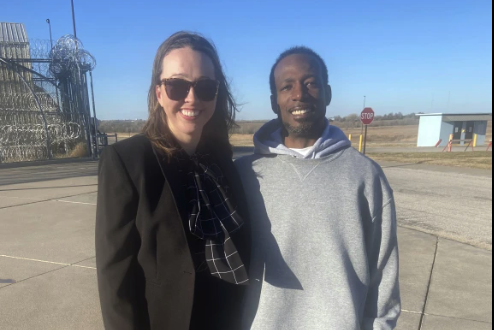Menthol Cigarettes Ban Update: Racial Consequences Explained
Why Do We Need A Menthol Ban? Renowned Tobacco Control Leader Explains Racial Consequences, Benefits
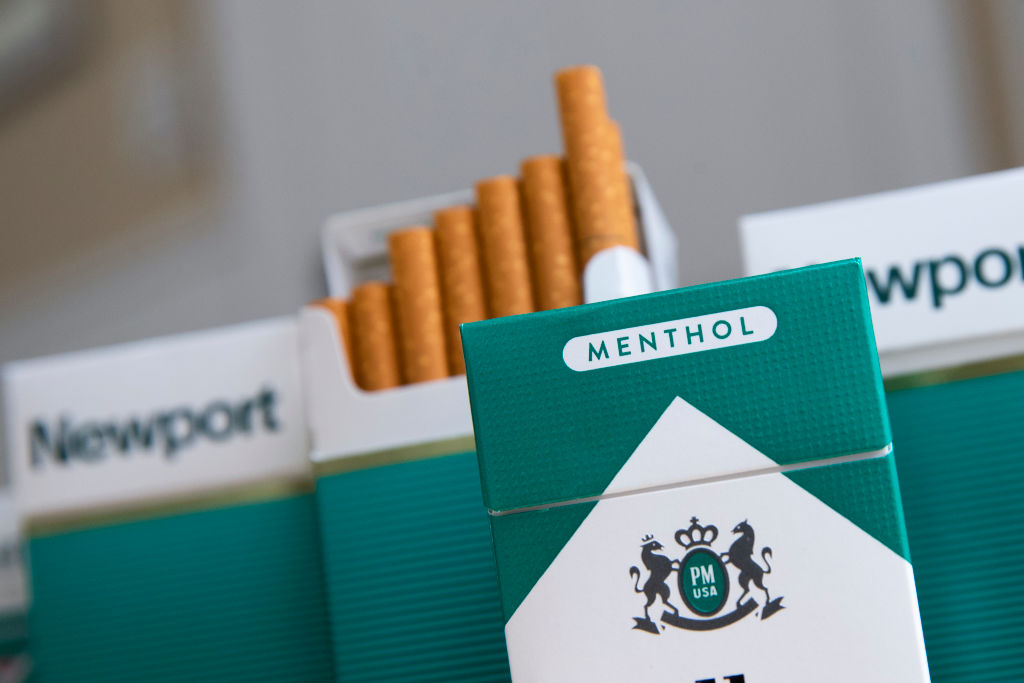
Source: Drew Angerer / Getty
The pending review of proposed rules to ban menthol cigarettes means it’s likely just a matter of time before the federal government codifies them to outlaw a product that statistics show is disproportionately favored by Black smokers.
Proponents and opponents of the proposed rules agree that tobacco is a “killer of Black people,” but they remain divided along ideological lines as each side says they’re working on behalf of the best interest of Black smokers.
In particular, some activists in the Black community have denounced the proposal as being racist and having serious “policing” consequences while questioning why there isn’t the same energy toward all tobacco products.
But a leader in the field of tobacco control told NewsOne that the menthol ban is immediately necessary not only because of obvious health reasons but also as a means to correct decades of predatory behavior from the tobacco industry that has targeted Black smokers specifically with its menthol tobacco products.
Racial justice groups like the NAACP have welcomed the proposal as being long overdue, a sentiment shared by Carol McGruder, the co-chair of the African American Tobacco Control Leadership Council, of which she is a founding member.
McGruder, a Black woman, described the proposed rules to NewsOne as a “first big step that will prevent another generation of our people from getting hooked.”
Without mentioning the topic of race, the U.S. Food and Drug Administration announced the proposal last year as a means to prevent youth consumption of such products.
“The proposed rules would help prevent children from becoming the next generation of smokers and help adult smokers quit,” Health and Human Services Secretary Xavier Becerra said in a statement. “Additionally, the proposed rules represent an important step to advance health equity by significantly reducing tobacco-related health disparities.”
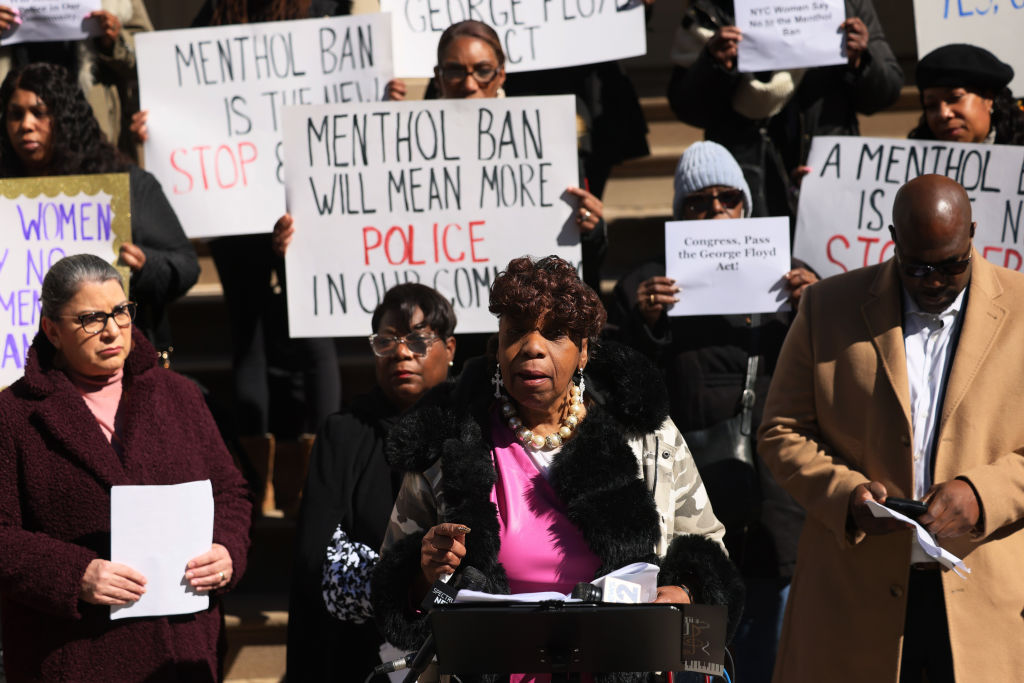
Founder of the E.r.i.c. Initiative Foundation Inc. Gwen Carr, and mother of Eric Garner, speaks during a rally for the George Floyd Policing Act on the steps of City Hall on March 9, 2023, in New York City. | Source: Michael M. Santiago / Getty
According to statistics from the Centers for Disease Control and Prevention (CDC), nearly 77% of Black smokers prefer menthol cigarettes. That’s because, the CDC says, “the tobacco industry has aggressively marketed menthol products to young people and African Americans, especially in urban communities.”
CDC data also shows that Black people die from diseases related to tobacco use at a higher rate than whites even though Blacks smoke fewer cigarettes and start smoking at an older age than white people do, according to the CDC.
McGruder, who has been honored with the Martin Luther King Jr. Civic Engagement Award for her tobacco control work in San Francisco, underscored the effect of the commercial marketing of menthol products in the Black community.
“Our community has been preyed upon for decades. The impact, legacy and tentacles of the tobacco industry’s targeting run deep in our community,” McGruder said before adding: “This is happening!! Cities, counties, states and national initiatives are underway to help our Black smokers. Our people can and will quit, they just need the proper support. We need them alive and healthy and thriving. They need to know their community is behind them.”
Marguder said the menthol ban is also needed now to address what she said was an “egregious omission” from an Obama-era law that regulates the manufacturing, distribution and marketing of tobacco products.
“In 2009 when President Obama signed the Tobacco Control Act, all flavored combustible cigarettes were taken off the market EXCEPT menthol. Menthol was left on the market and this omission is unpardonable,” McGruder said. “We have been waiting for fourteen years and counting. In those fourteen years another generation of Black people have become addicted, we have waited too long for our government to give us the same protection other citizens were afforded. It is long overdue and time to correct the egregious omission of menthol.”
Another argument in favor of the ban is that menthol cigarettes are more addictive than regular ones, in part because the menthol flavor makes “smoke inhalation easier to tolerate and therefore promote nicotine addiction and smoking-related illness,” scientists at Yale concluded in a 2012 study. That research also determined that menthol cigarettes posed the worst risk to children, who not only find them easier to smoke because of the flavor but are also more frequently exposed to them at a younger age.
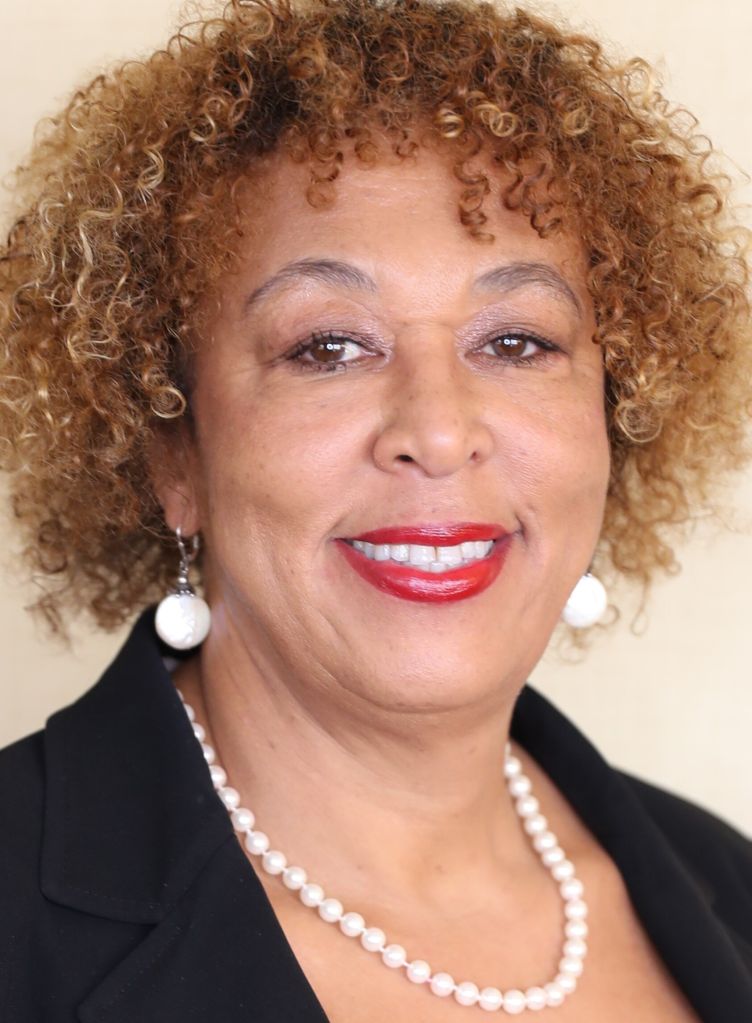
Carol McGruder | Source: Carol McGruder
On the flip side of the argument, there are advocates like Gwen Carr, whose son Eric Garner was infamously choked to death by a gang of NYPD officers who accused him of selling loose, untaxed cigarettes in public in 2014. Carr warned over the summer that banning menthol cigarettes doesn’t begin to address the likely legal domino effect that prohibiting those products will spark.
“Even though the medical profession says that it’s not going to be a policing issue, they’ll [law enforcement] be the ones imposing the consequences [of a menthol ban],” Carr said during a panel discussion. “This [ban] is not the answer. We have to do other things; we have to educate, counsel, treat. Stop the ban—it’s not the answer.”
Carr also said: “Menthol has not killed anyone, it’s nicotine. If you’re going to ban smoking, don’t make it a racist thing. Ban it all or ban none.”
The Rev. Al Sharpton has said that banning menthol cigarettes would not eliminate the demand for them and instead result in black market sales like what Garner was accused of conducting.
“Menthol prohibitions will create illicit markets and more police interactions, especially in minority communities,” NAN wrote in a June 2022 letter to Califf that was obtained by The Post. “For example, Eric Garner was a black killed by the NYPD for selling loose, untaxed cigarettes.”
“NAN is uniquely qualified to offer a valuable civil rights perspective on our concerns and the unintended consequences,” said the letter, which lists Sharpton along with NAN Chairman Franklyn Richardson.
“Historically, policies that lead to prohibitions have profound racial justice implications,” the organization added.
The civil-rights leaders asked why federal officials were targeting a ban on menthol cigarettes, which are disproportionately favored by black smokers, while other cigs smoked by whites were not being outlawed.
“Advocates for the proposed rule have not been able to explain why the preferred product for black adult smokers will be subject to ban while the select products of most will remain legal and available,” the NAN leaders said.
They said the ban “puts a microscope on minority communities.”
Dr. Benjamin Chavis, the President and CEO of the National Newspaper Publishers Association and former national NAACP leader, echoed that sentiment.
“There are many groups who still do not understand the unintended consequences of this proposed ban,” Chavis said at an event in August called “When Good People Write Bad Policy” that addressed the menthol ban. “For leaders in Washington to consider this ban without consulting Black and Brown officers is disastrous. Let’s sit down with the proponents and first conduct a Racial Impact Study. Targeting in the past doesn’t justify targeting now. We are against racial targeting and profiling. All of it.”
Other critics of the ban like the Washington Post’s Eugene Robinson have expressed similar concerns that introducing a criminal element to smoking menthol cigarettes would likely disproportionately affect the same Black people the ban is supposed to be helping.
“Given all the ways that Americans of all races manage to obtain illicit mood-altering substances of all kinds, we should anticipate the emergence of an underground market in menthol cigarettes,” Robinson wrote in a column in 2020.
McGruder said such concerns, while valid, are the result of a successful fearmongering campaign mounted by the tobacco industry.
“The tobacco industry has cynically exploited the deadly success of their decades of racist targeting and the legitimate need for police reform to tap into our community’s visceral fears of police brutality,” explained McGruder.
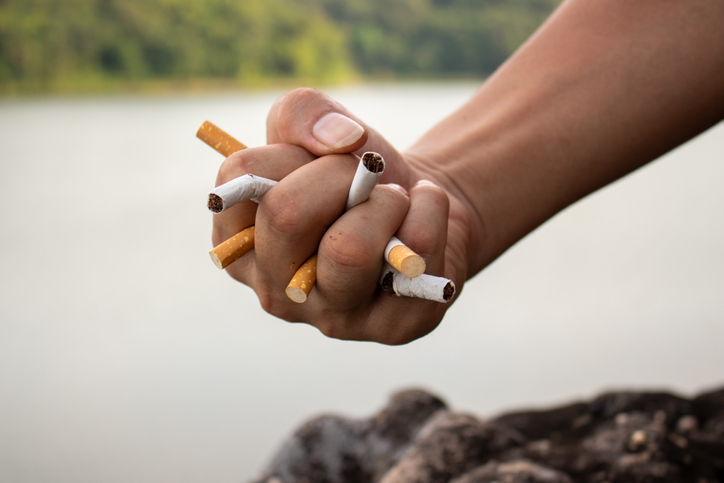
Source: Thinnapat / Getty
The FDA has stressed that a ban on menthol cigarettes would not be illegal by definition.
“The tobacco industry espouses the rhetoric that Black people will be prosecuted for smoking or possessing menthol cigarettes BUT the FDA regulations go to the source … the tobacco industry cartel who are federally adjudicated racketeers under RICO statutes,” McGruder said. “These products will be totally removed from the market, nothing left to smuggle or sell. The tobacco industry will be held accountable.”
According to statistics from the American Lung Association, Black people account for the second-highest percentage of smokers in the U.S., edging white people by just two-tenths of a percentage point (16.8% to 16.6%). But more than three times as many Black people smoke menthol cigarettes compared to white smokers.
Conversely, though, young Black smokers represent the second-lowest group of cigarette smokers aged 12-17. Additionally, cigars, not cigarettes, were reported as being the most popular tobacco product among Black high school students.
But it’s “not about individuals,” McGruder said.
“Those in our community who defend the tobacco industry and want to keep these deadly products in our communities SHOULD be demanding reparations from the biggest killer of Black people,” McGruder continued. “Big Tobacco, their reign over our community is coming to an end.”
SEE ALSO:
Documentary Shames Tobacco Industry For Targeting The Black Community
One Of The Country’s Most Segregated Cities Has Easier Access To Tobacco Than Healthy Food


